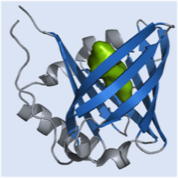The Consortium aims to develop and produce the PRS-080 Anticalin®, a novel high-affinity, non-immunoglobulin protein derived from the lipocalin protein family, to target and antagonize hepcidin. Hepcidin is a small peptide circulating in the human body and is thought to be a key negative regulator of iron homeostasis. The therapeutic goal of PRS-080 is to block hepcidin and thereby increase the systemic availability of iron in the circulation and, in turn, increase hemoglobin levels in patients suffering from anemia of chronic disease (ACD). ACD, the most frequent anemia found in hospitalized patients, develops in subjects suffering from infections, inflammatory and autoimmune disease, cancer and chronic kidney disease.

- binding of the relatively small hepcidin target with high affinity and specificity within the Anticalin pocket
- favourable safety and tolerability
- adjustable half-life
- low production costs
The figure above is a graphic representation of an Anticalin binding a peptide or small ligand target (in green) within its pocket.
The Project

